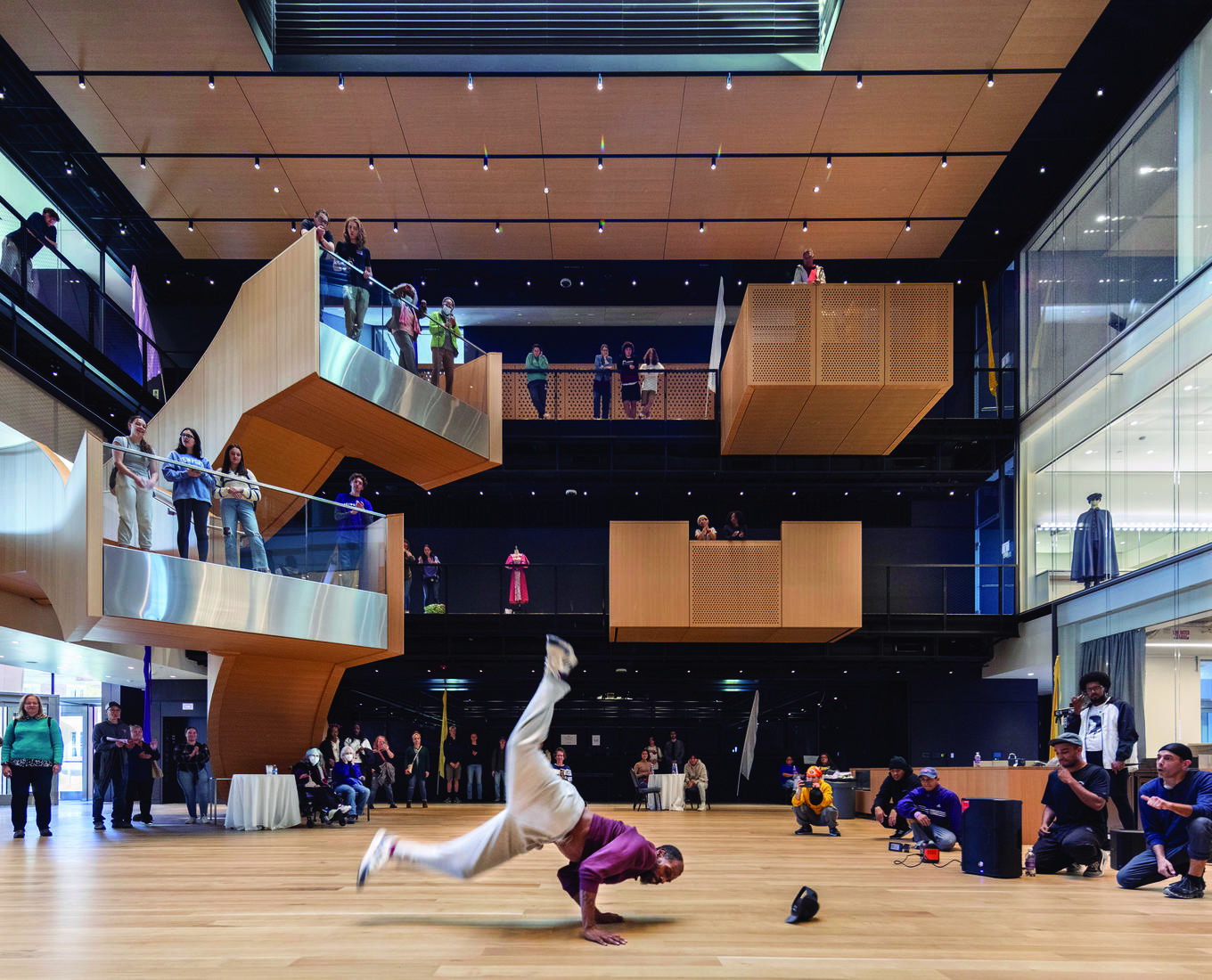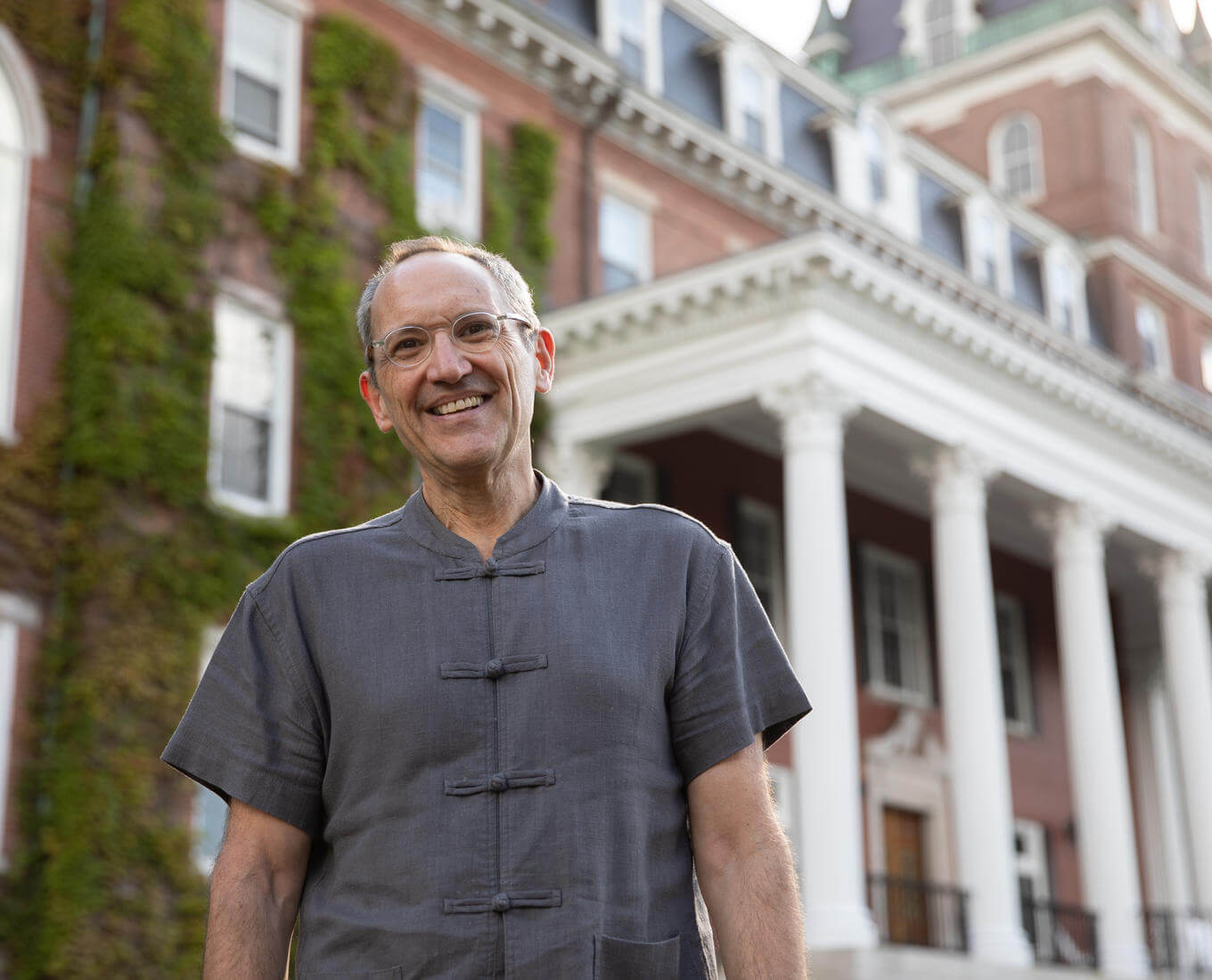When Julianna Stratton ’26 discovered that she had been accepted into a program in which she would learn about and compose music for film with award-winning professionals over spring break, she was excited — and a little daunted.
“For all of us, it was a leap into the unknown,” the music and neuroscience double major said. “None of us had exposure to composing for film.”
But, she was curious: After Holy Cross, she aims to attend grad school for composition, and the chance to learn about film scores in this setting “was really unique,” she said. “There’s never been anything like this where you hunker down and write for a week, so it was cool to see the arts move to a central place on campus.”
In early March 2025, the College’s Prior Performing Arts Center hosted its first-ever Spring Break Arts Immersive: Composing for Film. Grammy Award winning artist Osvaldo Golijov, Prior Composer-in-Residence, alongside his frequent collaborator, Grammy-nominated Jeremy Flower, led six students through an intimate week-long intensive in which they learned about the musical fundamentals and technological tools used in film scoring.
The immersive, Golijov said, is a very simple idea: “It’s like summer camp, but in winter.”
Students applied for the opportunity by responding to a prompt detailing their interest in film music and experience in composition software. The selected six came from a range of studies, including computer science, creative writing, English, film studies, neuroscience and music.
Golijov, who has also received MacArthur and Guggenheim fellowships and has taught at Holy Cross for more than three decades, based the idea for the immersive on the Sundance Institute Film Music Intensive. At the College, he taught such an immersive before, but it was online during the pandemic. Getting to spend a week together in person, he felt, would come with its own benefits.
“I realized I learned so much more in casual conversations than in editing and scoring sessions,” noted Golijov, who has scored four Francis Ford Coppola films, including 2024’s "Megalopolis.” “That’s what the immersive proposes: the way apprenticeships happened in history. Apprentices all lived together, spent their entire day together, had meals together, so a week of absolute concentration to devote ourselves to just one thing, that is rare these days.”
Students indeed spent the week together in The Prior Performing Arts Center: studying, sharing meals and watching films with Golijov and Flower.
“It’s very hands-on,” Golijov said. “The students had so much attention: two professors for six students.”
Flower, who’s worked with Golijov on his Grammy-winning albums, also noted the program’s uniqueness: “That's exciting to me: trying to get young adults to step out of their comfort zone and do something they haven't really been asked to do in a collegiate setting before.”
Each day, Golijov and Flower offered students a clip from a film featuring everything but the music. Analyzing the characters, script and sound effects, the students would get an idea for the film’s tone and genre, using that as a springboard for composition. Golijov and Flower would also offer prompts for the students to accomplish, which may address the film’s pacing or emotional underscoring. Then, the students were off composing.
“Osvaldo and I floated from student to student to help them fix any issues they were having compositionally, technologically and answer questions,” Flower said. “After that, we had a show and tell amongst the students where they listened to others’ work and gave feedback.”
Such dedicated time and expertise are what Kyle Frisina, Nancy Savage Skinner ’79 Interim Director, hopes the experience affords students.
“Students are eager for these community-building opportunities,” Frisina said. She views the week-long immersive — a noncredit experiential learning opportunity — as not only offering students new skills, but also highlighting the process by which art takes shape.
“The creative arts reward the opportunity to spend extended time on a project,” she said. “This immersive programming allows students to really go deep with their artistic practice, while also offering them the chance to connect with working professionals who can help them bridge from their liberal arts education to a life in the arts.”
That particular offering is what Stratton appreciated about the week spent with peers and professionals. While she was completing assignments, Golijov and Flower might be tinkering with their own.
“They’d be writing their own stuff, as well: They’re working alongside us, walking us through their process,” she said. “You think of bigshot composers as doing something different than you but, in reality, they were sitting beside us doing the exact same thing. It was this experience of demystifying what it means to work in the arts.”
Beyond the technical skills gained, Flower sees the immersive as offering students an opportunity to increase confidence: “A lot of people feel like writing music is dark art or is something you have to be a certain kind of person to do. It’s actually not; I want to show people that with a little fun, and if you think about what you’re doing and rely on your musical intuition, you can create something.”
The immersive also offered another important soft skill: working with feedback.
Artists can sometimes “find it difficult to receive and give criticism, especially with something as personal as music,” Flower said. Nonetheless, “feedback is crucial when you’re writing for film.”
Edits push the process forward and open up new ideas, he said, and spending so much time together can make it easier for students to trust one another and respond to others’ work.
It’s a skill that’s applicable in various environments, and Frisina said this sense of collaboration is rooted in The Prior’s mission: “The Prior is about coming together, breaking down barriers, making visible the often invisible cooperative labor that goes into artistic experiences.”
For Golijov, the Prior is “an unbelievable facility,” and such immersives offer “a kind of antidote” to the dominant culture in which art is rushed or seen as a product, not a process, he noted.
Such immersives, he said, “recover the wholesomeness of our attention and see the results” of spending dedicated time on a craft.
This kind of concentration created an experience Stratton won’t forget: “It was an incredible experience. The biggest takeaway is this idea that you can do this. The arts feel so hard to break into — you have to go to a conservatory, you have to be a prodigy to do this as a career — and how the instructors encouraged us made it accessible. It’s not some distant thing; you can do this now, and just in a week you can create something meaningful.”
Seeing the interest students take in such opportunities, “we're excited to introduce Composing for Film as the first of what we hope will become a full slate of arts immersives over breaks at the College,” Frisina said.
“It’s very satisfying, though not surprising, to see such student appetite for this kind of programming,” she continued. “For students to make connections between their academic curriculum and their interest in the arts beyond the classroom: this is the promise of The Prior."

